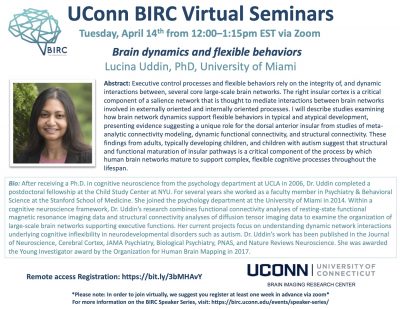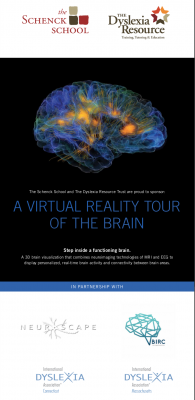This study is currently recruiting people between the ages of 12 and 40, with or without a history of autism, to participate in a study about autism and language development. The study is currently occurring online!
Uncategorized
MRI Research Study of Speech and Language
Volunteers are needed to participate in a research study investigating how the brain processes speech sounds.
Assistant Professor (TT) in Speech, Language, and Hearing Sciences
Come join UConn’s outstanding cognitive science community and the Department of Speech, Language, and Hearing Sciences, right next door to BIRC!
In Memory of Dr. Ross W. Buck
Dr. Ross W. Buck was one of the first researchers to use BIRC and continued his work on the brain mechanisms of emotional and cognitive empathy in nonverbal communication until shortly before his death. He will be greatly missed at BIRC.
Dr. Ross W. Buck passed away peacefully in Windham Hospital on September 1, 2022. He was born on August 16, 1941 in Sewickley, PA to Ross and Ruth Buck. He was preceded in death by his parents and his sister, Judith Buck Davis. He leaves his wife, Marianne of 58 years; children Ross William and his children Eleanor (Al) and William Christopher of Washington, DC; Maria Lenore of Brooklyn, NY; Nancy Jenney of White Plains, MD; and Theodore Reed and his children Maya Rose and Hannah Judith of Tolland, CT. He also leaves cousins, Lynda Thill of Gibsonia, PA and Marilyn McAllister of Coraopolis, PA, sister- and brother-in law, Nancy and Howard Pears of Meadville PA, in addition to many nieces and nephews. Ross also leaves many grieving colleagues and those he often referred to as his second family, former graduate students – too many to count from his 48 years of teaching at the University of Connecticut, Storrs. Although he was an amazing father to our four children, he always had room in his heart for more of his students whom he mentored.
Ross earned his PhD in Psychology from the University of Pittsburgh and his early career included work at the University of Pittsburgh School of Medicine followed by appointments to Carnegie Mellon University and the University of Connecticut, where he was a Professor of Communication and Psychology. He authored four books on Communication, Emotion, Motivation, and Nonverbal Communication and numerous chapters and professional journal articles. He served as Editor of the International Society of Research on Emotion Newsletter and belonged to many professional organizations.
Elisa Medeiros receives the 2022 CLAS Staff Excellence Award
Congratulations to Elisa Medeiros on receiving the 2022 CLAS Staff Excellence Award! The Staff Excellence Award honors individual staff members across the College who bring distinction and innovation to their work and help to promote the CLAS mission.
BIRC Trailblazer Awarded
Congratulations to Margaret Briggs-Gowan, PhD, Xiaomei Cong, PhD, Todd Constable, PhD, Fumiko Hoeft, MD, PhD, Helen Wu, PhD, Damion Grasso, PhD on receiving the BIRC Trailblazer award for their project Preliminary Longitudinal Study of Fetal, Neonatal and Infant MRI!
This proposal will ultimately contribute important foundational knowledge in the following areas: (1) neurodevelopmental outcomes of children exposed to drugs in the prenatal stage that may be dependent on the nature, timing, and dosage of environmental insult in addition to the child’s neurobiological-genetic- genomic factors and resilience/reserve; (2) timing of opportunities and modifiable targets; and (3) assessing underlying mechanisms of substance use disorder and withdrawal symptom across mother-infant/child generations. Ultimately, research such as ours may help to optimize circuit-based precision interventions in these vulnerable children that have rapidly increased in recent years.
NSF Award to Erika Skoe and Emily Myers
Congratulations to Erika Skoe and Emily Myers on their NSF grant Neural predictors of individual differences in speech perception!
Virtual Talk: Lucina Uddin, University of Miami
University of Miami
Brain dynamics and flexible behaviors
Tuesday, April 14th from 12-1:15pm EST via Zoom
**Register here for Zoom using your institution/university email address**
Bio: After receiving a Ph.D. in cognitive neuroscience from the psychology department at UCLA in 2006, Dr. Uddin completed a postdoctoral fellowship at the Child Study Center at NYU. For several years she worked as a faculty member in Psychiatry & Behavioral Science at the Stanford School of Medicine. She joined the psychology department at the University of Miami in 2014. Within a cognitive neuroscience framework, Dr. Uddin’s research combines functional connectivity analyses of resting-state functional magnetic resonance imaging data and structural connectivity analyses of diffusion tensor imaging data to examine the organization of large-scale brain networks supporting executive functions. Her current projects focus on understanding dynamic network interactions underlying cognitive inflexibility in neurodevelopmental disorders such as autism. Dr. Uddin’s work has been published in the Journal of Neuroscience, Cerebral Cortex, JAMA Psychiatry, Biological Psychiatry, PNAS, and Nature Reviews Neuroscience. She was awarded the Young Investigator award by the Organization for Human Brain Mapping in 2017.
Abstract: Executive control processes and flexible behaviors rely on the integrity of, and dynamic interactions between, several core large-scale brain networks. The right insular cortex is a critical component of a salience network that is thought to mediate interactions between brain networks involved in externally oriented and internally oriented processes. I will describe studies examining how brain network dynamics support flexible behaviors in typical and atypical development, presenting evidence suggesting a unique role for the dorsal anterior insular from studies of meta- analytic connectivity modeling, dynamic functional connectivity, and structural connectivity. These findings from adults, typically developing children, and children with autism suggest that structural and functional maturation of insular pathways is a critical component of the process by which human brain networks mature to support complex, flexible cognitive processes throughout the lifespan.
Click here to see the full BIRC Speaker Series schedule and access recordings of past talks.

Fumiko Hoeft Receives Eye-to-Eye Academic Excellence Award
Fumiko Hoeft, MD, PhD recently received an award from nonprofit organization Eye-to-Eye for her work with Stephanie Haft: Impact of mentoring on socio‐emotional and mental health outcomes of youth with learning disabilities and attention‐deficit hyperactivity disorder. The paper can be accessed here.
To learn more about Eye-to-Eye and their mission, visit their website.
Tour the Brain: BIRC at the International Dyslexia Association 2018 Annual Conference

The BIRC is thrilled to announce its first community outreach event. UConn BIRC is partnering with the International Dyslexia Association (IDA) and Neuroscape to host a virtual reality tour of the brain. Join us in making neuroscience fun and accessible to the public!
The VR tours will take place at the IDA Massachusetts and Connecticut booth located in the exhibit hall at Foxwoods Resort and Casino October 24th through 26th.
For additional information, including registration, please visit IDA’s website.